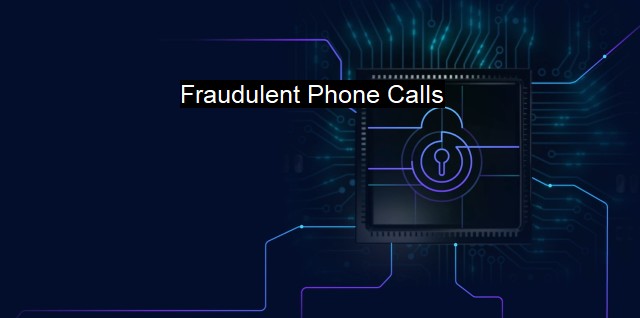What are Fraudulent Phone Calls?
Don't Get Fooled: Understanding and Avoiding Fraudulent Phone Calls in Cybersecurity.
Fraudulent phone calls, often referred to as vishing or voice phishing, are deceptive practices conducted via the telephone to deceive individuals into revealing their personal or sensitive information like credit card numbers, social security numbers, and bank account information.In the last few years, phone call fraud has become an issue of grave concern in the realm of cybersecurity. Scammers are getting more ingenious by the day, discovering new, sneaky ways to impersonate genuine representatives from established organizations, often tricking the unwary into surrendering essential data.
These fraudulent activities are typically disguised as calls from businesses, governmental bodies, or nonprofits. The fraudsters often provide plausible reasons requiring you to share confidential materials. Reasons may range from database updates, rewards, surveys, charity fundraisers, or urgent hazards to your bank account, prompting immediate reaction.
The implications of fraudulent phone calls extend beyond individuals. Companies are not exempt from these scam operations. Impersonated management, false IT departments or vendors, and counterfeit client calls are few of the multitude of approaches employed to defraud businesses, which in some instances, lead to debilitating financial loss and reputational damage.
Cybersecurity, in this case, engages a set of techniques utilized to preserve the integrity of software programs, networks, devices and data from deceitful phone calls. It is structured to ensure a system's continuous reliability, confidentiality, and accessibility, focusing on securing information from falling into the wrong hands through digital crime or data dishonesty.
Effective cybersecurity approaches recognize the landscape of the ever-evolving threat scenario and the design, implementation, and utilization of smarter defensive strategies. Measures should include installing respected antivirus software to restrain worms, spyware, and other nefarious malware.
Antivirus software magnifies security by detecting and eliminating threats before they can do damage. It scans for warning signs, then separates or deletes harmful software and files. This approach offers a considerable level of tangent protection against deceptive information and potential risks emerging from fraudulent phone calls.
Education also plays a significant part in combating fraudulent phone calls. Informing individuals and enterprises about popular fraudulent strategies and how to recognize them, media theatrics often used by defrauders, the significance of not overlooking dubious inquiries, verifying call sources, declining requests for personal or confidential information via phone, and reporting fraud offenses can greatly mitigate the threat.
Caller ID authentication technology advancements have proven worthwhile in the battle against this fraud form. They ensure a call was not manipulated or intercepted and was genuinely placed from displayed number, providing consumers with further call source trustworthiness.
Regulatory bodies and communication service providers are also playing crucial roles. the Federal Communications Commission (FCC) and the Anti Phone Scam Task Force work in collaboration to flag or block illegal calls.
Falling pry to fraudulent phone calls can be distressing and financially damaging both for unsuspected individuals and unprepared business organizations. Therefore, maintaining strong cybersecurity measures such as efficient and updated antivirus solutions, careful discernment, prompt caution with unsolicited calls, public consciousness about prevalent scams, and much-needed regulatory interventions are necessary to fight this escalating issue. Protecting our digital footprint and our sensitive data requires a collective, multifaceted approach. Responding to this era's progressively astute scammers unequipped is no longer an option.

Fraudulent Phone Calls FAQs
What is a fraudulent phone call in the context of cybersecurity?
A fraudulent phone call in the context of cybersecurity is a phone call made by a scammer pretending to be a legitimate organization, such as a bank or government agency, in order to trick the recipient into divulging sensitive information like passwords or credit card numbers.How can I protect myself from fraudulent phone calls?
To protect yourself from fraudulent phone calls, you should never give out personal information over the phone unless you initiated the call and are certain you are speaking to a legitimate representative. Additionally, you can use anti-virus software and caller ID to screen calls from unknown numbers.What should I do if I receive a fraudulent phone call?
If you receive a fraudulent phone call, do not give out any personal information. Hang up the phone and report the call to the appropriate authorities, such as your bank or local law enforcement.What are some common signs of a fraudulent phone call?
Some common signs of a fraudulent phone call include unsolicited calls, requests for personal information, vague or threatening language, or requests for payment or gift cards. If you are unsure if a call is legitimate, hang up and contact the organization directly using a phone number you know to be valid.| | A | | | B | | | C | | | D | | | E | | | F | | | G | | | H | | | I | | | J | | | K | | | L | | | M | |
| | N | | | O | | | P | | | Q | | | R | | | S | | | T | | | U | | | V | | | W | | | X | | | Y | | | Z | |
| | 1 | | | 2 | | | 3 | | | 4 | | | 7 | | | 8 | | |||||||